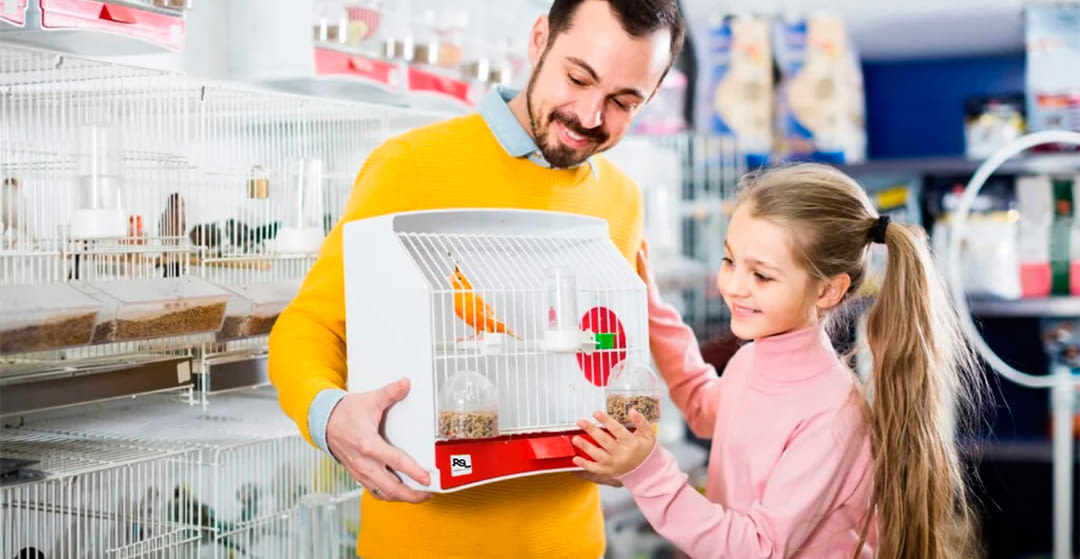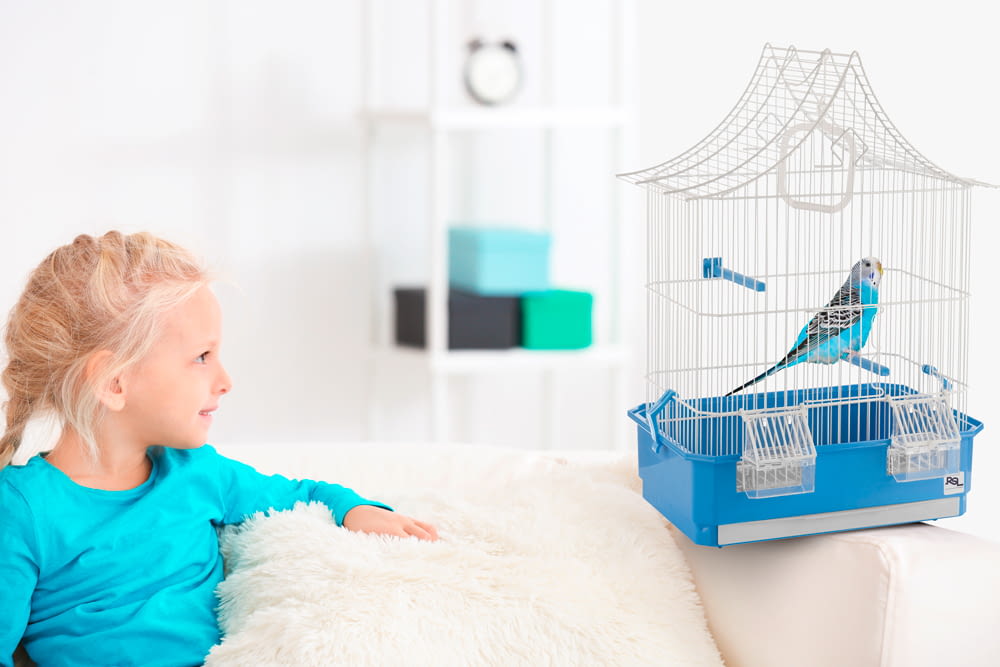
Birds are the preferred pets in Spain behind dogs and cats. They are an ideal option for those people who do not have much time to dedicate to a pet because, for example, they spend many hours away from home. Among the most outstanding are the lovebirds, canaries and parrots.
Smart and beautiful, pet birds bring many benefits to their owners. Some of these advantages can be surprising.
- Long life. Most pet birds have a fairly long lifespan, compared to pets. This means that its owner will not have to deal with the grief of losing his friend to old age, after just a few years, as he would with a dog or cat. Birds are a company for life. In fact, many species of parrots can outlive a human.
- Social interaction. Recent studies have shown that having birds encourages social interaction, which is good for mental health. This is especially true with birds that are capable of "talking."
- The satisfaction of caring for an animal. Pets fulfill the need to care for someone. Birds are particularly good at this, because they require a lot of personal attention and interaction with you to stay healthy.
- Reduce stress. Petting an animal has been shown to reduce stress and blood pressure. Just remember to pet your bird against the arrangement of the feathers to avoid increasing his stress level. In general, they do not like to have their feathers stroked. Stroke against the grain.
- Mental activity. As you get older, you may start to slow down and not learn as much. This can pose a risk of early dementia. The phrase “use it or lose it” applies to the brain as much as anything else. Teaching tricks to a bird, whatever the species, keeps the mind awake and entertained. This type of brain exercise is great for promoting healthy cognitive functioning.
Both before having these precious pets as companions at home and during their coexistence, the owners make many consultations in their trusted petshop with the aim of providing them with the best care.
At RSL Pets, aware of the changes to which our sector is continuously subjected, we are constantly evolving and improving to provide the best products and services, therefore, following a recent study on the needs of our customers, we have extracted the following data about what are the most common questions they encounter daily in their specialized stores.
What is the best species of bird to have as a pet?
Before choosing a certain species or another, the decision is influenced by compatibility with the lifestyle, longevity of the species, size and space in the home to provide it with the best care, noise level since there are many species that are very sensitive to high levels noise pollution, interaction and socialization, level of difficulty in providing specific care...among other factors that you must always take into account when recommending one species or another to your customer.
How long can a bird live in captivity?
Having a bird as a pet like any other companion animal is a huge commitment and depending on the range of lifespans depending on the species of bird the commitment can be long term. It is very important to keep in mind, like any other pet, that as it gets older, its needs, care and attention change.
What type of cage is the most suitable for my bird?
It is crucial to know the type of cage that is right for your bird before keeping it as a pet. The correct choice of the cage is vital to guarantee the safety, well-being and comfort of the bird.

What do I need to include in my bird's diet?
Knowing what the right diet for the bird is and combining it with a certain type and volume of treats to reward it is essential for its well-being and health, as well as knowing what supplements are necessary at certain times to treat a pathology or strengthen its immune system. .
What is the best way to socialize my bird and make him feel comfortable in his new environment?
Socialization and the establishment of a comfortable environment are essential for a bird's emotional well-being and adaptation to its new environment. Establishing a bond of trust with the bird is essential, as is providing it with a routine and stability by combining gradual manipulation with games and controlling exposure to new stimuli, keeping in mind that each bird is unique and may require different periods of time to socialize and adapt. .
How can I teach my bird tricks?
Teaching a bird tricks can be an enriching experience for both the bird and the keeper, since it stimulates their mind, strengthens the bond and communication, as well as providing the bird with exercise and physical activity while improving its well-being and emotional balance.
Coexistence with other species of birds or types of pets
If by itself each animal is unique, each species also has its characteristics that may be more or less compatible with another. In the event that two different types of birds have to live together in the same environment, it is essential that the owner knows what can be found to provide them with adequate welfare, as well as, in the event that the bird has to live with another different animal, it should Know its compatibility with other pets before introducing it to a shared environment and how to proceed in important points such as: safety, eating habits, supervision and separation, and gradual introduction.
What are the signs of disease in a bird and what should I do if my bird shows signs of disease?
Recognizing certain basic signs for certain types of common pathologies in birds or certain species is of vital importance to prevent and act correctly in certain situations and to contact or go to the vet as soon as possible.
When should I take my bird to the vet for a regular checkup?
It is essential to take the bird to the veterinarian for regular checkups as part of its care and to maintain its optimal health, whether it is for the early detection and prevention of diseases, assessing its state of health, obtaining advice on proper feeding and care, parasite control and communicable diseases and have all your documentation on monitoring your health perfectly in order.
What kind of toys and environmental enrichment are recommended for my bird?
Knowing what type of toys and accessories are suitable for certain species of birds will help them stay active and entertained, which is not only tremendously beneficial for their physical and mental health, but is also essential to ensure their well-being and safety since there are certain objects that due to their characteristics are more positive for one type of bird or another.
What is the best way to clean and maintain my bird's cage?
The hygiene of the habitat of any pet is essential and in the case of birds it cannot be otherwise. Knowing little tricks to have adequate hygiene and detoxification of the cage will ensure that the bird is always in a clean and healthy environment in which it will undoubtedly feel more comfortable.
What are the main threats to bird health and how can I prevent them?
It is crucial to know the main threats to the health of birds and take preventive measures to keep them safe and protected. Providing your client with information about common infectious diseases, internal and external parasites or common injuries and accidents and how to proceed initially before going to or calling the vet will greatly help them provide the best care and in certain cases save their live.
What is the right temperature to keep my bird at home?
Knowing and maintaining an adequate temperature in the bird's environment is essential for its well-being, health and comfort. By providing a stable and appropriate thermal environment, you help prevent disease, minimize stress, and promote healthy living.
Should I clip my bird's wings?
One of the most controversial practices in poultry farming is feather trimming, also called clipping, which is practiced to limit their ability to fly. As usual, this system has as many defenders as detractors. Therefore the decision to clip a bird's wings is a controversial issue and should be carefully considered.
How can I train my bird to eliminate in a specific place?
We have already discussed the importance of teaching the bird tricks and in this case training it to relieve itself in a specific place, such as a tray or a newspaper, can be beneficial for both your client and the bird since it promotes hygiene and hygiene. cleanliness, reducing pollution in their environment while facilitating play and interaction, stimulating their mind.
And these are some of the most common questions that usually arise in our clients' specialized stores. Can you think of any more? If so, do not hesitate to contact us and we will provide more information.



